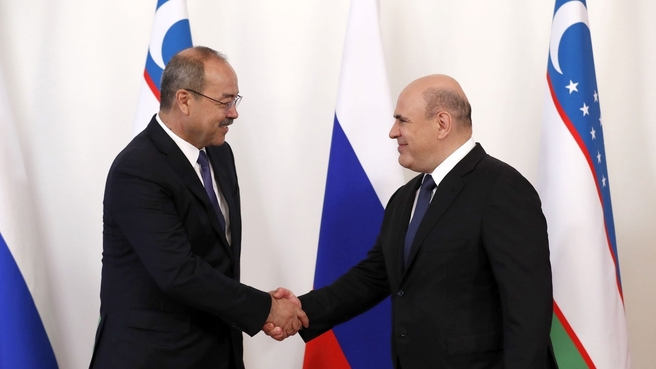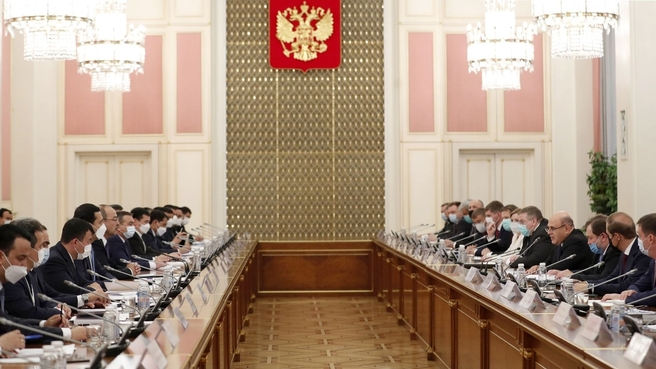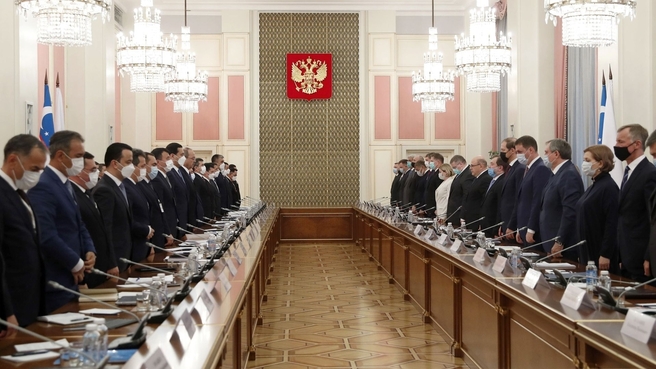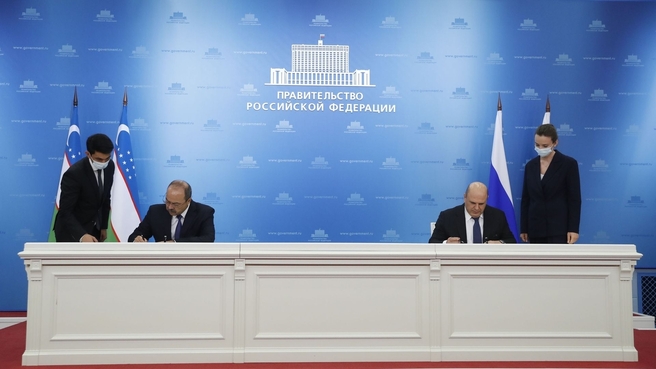The agenda included key issues of bilateral cooperation.
Meeting of the Russia-Uzbekistan Joint Commission at the level of heads of government
Excerpts from the transcript:
Mikhail Mishustin: Good afternoon, Mr Aripov. Good afternoon, colleagues.
We are delighted to welcome you to Moscow at a meeting of the Russia-Uzbekistan Joint Commission at the level of heads of government. This unique format was created at the initiative of the presidents of our two countries, Vladimir Putin and Shavkat Mirziyoyev.
Our agenda includes key aspects of our bilateral cooperation and interaction. It will become an important milestone in the preparation for the upcoming state visit of the President of Uzbekistan to the Russian Federation.
Colleagues, before we start, I would like to say a few words about today, 22 June. It is the Day of Memory and Grief. On this day, exactly 80 years ago, the Great Patriotic War broke out, the most brutal and bloody conflict in world history that claimed tens of millions of lives. Today we pay tribute to those who fought as well as to the home front workers who defended the independence of our Motherland through the hardest trials that befell the generation that took up arms and protected us.
This is part of our common history. The fraternal people of Uzbekistan made a significant contribution to the victory over Nazism. Hundreds of thousands of Uzbek citizens showed extraordinary courage and heroism. Just as Russian soldiers, many of them never returned from the battlefield.
I suggest we honour the memory of all soldiers who fought valiantly at the front, and pay tribute to the people who, at the cost of their own lives, won the Great Victory.
Please join me in a minute of silence.
A minute of silence.
Thank you.
I would now like to move on to the agenda of our meeting.
The Government of the Russian Federation pays special attention to strengthening strategic partnership with the Republic of Uzbekistan. Our cooperation is based on the principles of friendship, neighbourliness and mutual respect that unite our fraternal peoples. We are sincerely interested in taking Russian-Uzbek interaction to an even higher level and filling it with promising joint projects and initiatives, jointly confronting new challenges, primarily, the coronavirus pandemic, and protecting the life and health of the citizens of our states.
Russia and Uzbekistan are active in integration associations. We meet regularly. Quite recently, in late April, Mr Aripov and I took part in a meeting of the Eurasian Intergovernmental Council in Kazan.
We welcome constructive interaction with Uzbekistan as an EAEU observer state. You can learn more specifics about the work of our association, the procedure for drafting and adopting decisions on critical matters of economic cooperation within the union, and take a look at the experience of creating common markets for goods, services, capital and labour without barriers, exemptions or restrictions.
I am convinced that Uzbekistan’s full-fledged participation in the EAEU will boost Uzbekistan’s economy and, of course, provide tangible benefits for its citizens.
Speaking of bilateral relations, we have posted good results despite the pandemic. Last year, bilateral trade grew by over 15 percent to almost $6 billion. In the first five months of 2021, growth continued and exceeded 15 percent, which totals about $2.5 billion. Russian exports are up by almost 12 percent, and imports from Uzbekistan have increased by about a quarter.
The agricultural supplies are growing fast largely due to large joint agro-industrial projects. Creating agrologistics complexes in Uzbekistan, as well as the development of wholesale distribution centres in Russia, are of paramount importance. In addition, we are opening transport logistics corridors as per the intergovernmental memorandum, which will be signed following our meeting.
We have great cooperation potential across all areas. I believe it is necessary to seriously expand cooperation in industry, the fuel and energy complex, including the peaceful use of nuclear energy, healthcare and education, the digital economy, and the high-tech sector in general.
Russian businesses are making a significant contribution to the development of the fuel and energy complex of Uzbekistan. There are many examples of that. In particular, Gazprom is participating in the development of major hydrocarbon fields. Joint construction of a new gas processing plant is underway at the Kandym group of fields. One of the leading investors – LUKOIL – plans to earmark over $12 billion for joint projects, in addition to the $8 billion that have already been invested in the development of energy capacities.
In total, over 2,000 enterprises with Russian participation operate in Uzbekistan. About 600 companies with the participation of Uzbek business have been registered in Russia. Promising projects in the automotive industry, power generation, pharmaceuticals and many other industries are under discussion.
I think it is critically important to strengthen contacts between our respective business communities and create a proper environment for establishing close ties.
In early April, Tashkent successfully hosted the 1st International Industrial Trade Fair INNOPROM. We are preparing for the next Interregional Cooperation Forum, and I am confident that it will launch new business projects.
Russia is ready to share its practical experience in many fields with Uzbekistan. We are working jointly to streamline the tax administration system. Our common goal is to facilitate the more advanced and efficient work of Uzbekistan’s tax agencies, to evaluate our colleagues’ interesting achievements, and to use essential software and technologies for this purpose.
We are also launching a pilot project to establish a state cadastre valuation system. In this sphere, we are ready to share the most advanced Russian solutions with our colleagues.
Digital technologies which also have great potential continue to actively penetrate the economy, the business sector, state administration and municipal utilities. Mr Aripov, you are a well-known specialist in this field, and you headed the relevant ministry in Uzbekistan.
Our companies offer competitive goods that can be shared. And I hope that these goods will help effectively introduce information technologies in all spheres of activity.
Mr Aripov, during your earlier visits to Moscow, you personally assessed a number of Russian solutions, including those in the field of tax administration and the labelling of goods. We will show you our new developments following this meeting. We have prepared especially for your current visit, and we have been expecting you. We have plenty to share and plenty to work on together. We will be happy to make good use of these opportunities.
Of course, our countries are united by traditionally strong educational and cultural contacts. We will continue to expand joint educational and cultural programmes.
We are already creating conditions for young people to be able to earn university degrees in Russia and Uzbekistan. We allocated over 200 scholarships for citizens of Uzbekistan during the current academic year, and we are set to provide about 400 for the next academic year.
Twelve leading Russian higher education institutions operate branches in Uzbekistan. We will increase their number. I believe that this is a highly important aspect.
I would like to note that we have scored specific results in all areas. A weighty package of documents will be signed following today’s meeting. This will create additional opportunities for cooperation between Russia and Uzbekistan.
Thank you.
Mr Aripov, you have the floor.
Abdulla Aripov: Mr Mishustin, colleagues,
I am delighted to be meeting with you again. We are grateful for the traditionally warm and hospitable welcome accorded to our delegation.
Mr Mishustin, I would like to add, in support of what you have said, that 80 years ago the world faced the worst experience in the history of humankind, the beginning of the Great Patriotic War. This date in our history has left a tragic imprint on the lives of millions of families. Nazism was defeated thanks to our nations’ selflessness, strong will and belief in justice. Our hearts will never forget the previous generations which preserved a peaceful sky for us.
Mr Mishustin, first of all, I would like to convey warm greetings and best regards from the President of the Republic of Uzbekistan, Mr Shavkat Mirziyoyev, to President of the Russian Federation Vladimir Putin and personally to you, Mr Mishustin.
Cooperation between Uzbekistan and Russia is gaining momentum, the growth dynamic is sustainable. It is based on the strategic course set out by President of Uzbekistan Shavkat Mirziyoyev and President of Russia Vladimir Putin. We also maintain intensive contacts at the level of our governments. Mr Mishustin, we have held three fruitful meetings with you this year alone.
At the same time, our ministries and agencies are also working together energetically, organising visits at various levels and outlining new promising spheres of cooperation. The visits by Deputy Prime Minister Alexei Overchuk, Minister of Industry and Trade Denis Manturov, Minister of Healthcare Mikhail Murashko and Russian Railways CEO Oleg Belozerov, as well as other heads of Russian ministries and agencies to Uzbekistan were productive. A few days ago we welcomed a delegation of industrial and business leaders led by the head of the Republic of Tatarstan Rustam Minnikhanov.
These active contacts are aimed above all at coordinating the agenda of the upcoming state visit of the President of the Republic of Uzbekistan to the Russian Federation.
We are energetically discussing practical projects and preparing for the planned forums involving our regions, university rectors and heads of our media outlets, as well as for opening the Uzbekistan Pavilion at VDNKh.
I am convinced that the results of the upcoming visit by the President of Uzbekistan to Russia will outline the main new areas of the further development of Uzbekistan-Russia cooperation based on the principles of strategic partnership and alliance.
Colleagues, as Mr Mishustin has mentioned, a unique three-level system of economic, investment, cultural and humanitarian cooperation has been created between our countries. A second meeting of the Joint Commission at the level of the heads of government is being held today. At the same time, we regularly hold meetings of the intergovernmental commission on economic cooperation and interdepartmental subcommissions. We believe that this mechanism of cooperation has been proved effective in practice.
For example, mutual trade has been growing this year despite the pandemic, thanks to the joint measures adopted by our governments. Mr Mishustin, as you pointed out, our trade increased by 15 percent between January and May.
If we maintain the sustainable growth of mutual trade, we will soon attain the target of $10 billion. The growth of mutual trade will also be boosted by the agreements our customs agencies signed today on the exchange of information about the customs value of goods, as well as on a simplified customs corridor.
I would like to especially note that Russia is Uzbekistan’s largest investor. To date, over $10 billion have been invested by Russian companies and banks in basic sectors of the Uzbek economy such as oil and gas, the mining industry, metals, energy, agriculture and others.
Over the past three years, the number of enterprises with the participation of the Russian capital doubled in Uzbekistan. In the first quarter of this year, 90 joint Uzbek-Russian enterprises have been created in the republic. The successful examples of our cooperation over the past year include the implementation of projects to increase the volume of stored gas, to upgrade power plants and to build industrial enterprises in the construction complex.
Cooperation has been established with leading financial institutions of the Russian Federation, such as the state corporation VEB.RF, the Russian Export Centre, Sberbank, Gazprombank and others. Credit lines provided by Russian banks were attracted to finance investment projects by small businesses and private entrepreneurs in Uzbekistan. Loans at a subsidised preferential interest rate, including in Russian rubles, have been successfully attracted as well.
We welcome the use of a new mechanism for financing private projects with the participation of Russian companies in Uzbekistan with the attraction of funds from the VEB.RF state corporation without sovereign guarantees of the Government. A project to create an agrologistics complex in the Jizzakh region is a case in point. We are interested in expanding the practice of using this financing mechanism for other projects with the participation of Russian companies.
We believe that the Russian Railways’ interest in participating in the project for the construction of the Mazar-i-Sharif – Kabul – Peshawar Afghan railway corridor, which will help form a groundbreaking model of international railway service, is important.
We believe it is necessary to expedite the work of the customs and phytosanitary authorities of the two countries on matters related to organising a regular Agroexpress rail service based on the green corridor principle, which caps the delivery time for agricultural produce by five days.
We are grateful for the decision to increase the number of regular flights between Uzbekistan and Russia. We propose continuing to work as a team in this area and to increase the number of regular flights to 14 per week on a parity basis in compliance with the applicable quarantine requirements. We also believe it advisable to gradually resume passenger rail service to the most popular destinations between our countries.
Culture and education are an integral part of our cooperation. Our cooperation in education is making strides. Over the past four years, nine branches of Russian universities have opened in Uzbekistan. In all, there are 12 of them, as Mr Mishustin has noted. It is planned to open three more branches of Russian universities this and next academic year: St Petersburg Mining University, Gerasimov Institute of Cinematography and Kazan Federal University.
The 3rd interregional conference of rectors of universities of Uzbekistan and Russia was held in Bukhara on 26 May; 23 memorandums and agreements on cooperation were signed. The joint educational project Class! is underway, which focuses on organising the Russian language studies at secondary schools.
Starting the new academic year, we expect another 200 specialist teachers to come to Uzbekistan. We are grateful to the Government of the Russian Federation for increasing the quotas for students from Uzbekistan.
We pay special attention to advanced cooperation in healthcare. Last May, an agreement on cooperation was signed between the Ministry of Healthcare of Uzbekistan and the Pirogov Russian National Research Medical University providing for the opening of a branch of this university in Tashkent.
We highly appreciate the support of the Russian leadership in tackling issues related to labour migrants in Russia. We were heartened by the decision to extend until 30 September the period of temporary stay of foreign citizens and stateless persons in Russia. We welcome the signing of an intergovernmental agreement providing for an increase in the period of stay of Uzbek citizens in the Russian Federation without registration from 7 days to 15 days.
Mr Mishustin, I would like to assure you of our readiness to provide all the necessary support to our Russian partners when implementing joint projects in Uzbekistan. I’m convinced that by joining efforts we will achieve our goals.
Thank you.
<…>
Mikhail Mishustin: Mr Aripov,
I would like to sincerely thank you, our Uzbek colleagues, friends and Russian speakers for their interesting and substantive reports. We have discussed the most important aspects of cooperation between the Russian Federation and Uzbekistan. We compared notes on our joint projects being implemented in industry, energy, agriculture, transport, science and education, as well as in the cultural and humanitarian fields. We also identified our strategic objectives that should lead to intensifying trade and economic cooperation between our countries. We have also outlined important measures and steps to combat the coronavirus infection.
A joint communique was prepared following the meeting, our respective executive offices worked on it. I believe it reflects our agreements and plans for further interaction. I would suggest, with your consent, that we approve it.
A substantial package of agreements in various fields has been prepared for signing. I am confident that these agreements will lay a solid foundation for further deepening Russian-Uzbek relations and long-term cooperation.
It seems to me that the activities of the Joint Commission at the level of the heads of government were commendable. It is a special format and it underscores the friendly and partnership nature of our relations.
I am confident that our meeting will become an important stage in the preparation of the talks between President of Russia Vladimir Putin and President of Uzbekistan Shavkat Mirziyoyev during his upcoming state visit to Russia.
Mr Aripov, I invite you to deliver concluding remarks at this stage of our meeting.
Abdulla Aripov: Mr Mishustin, [JD1] participants in the meeting,
I would like to first of all express my sincere gratitude to the Government of the Russian Federation and to you personally, Mr Mishustin, for organising today's event at such a high level. And I am also grateful to all members of the Joint Commission for their fruitful work and constructive dialogue.
During the meeting, we have discussed an extensive bilateral cooperation agenda. We have carefully analysed the state of affairs in specific areas of partnership. We have thoroughly considered the outlook for further building up trade, economic cooperation and investment, as well as transport, transit and cultural and humanitarian ties. As a result of the exchange of views, we outlined specific plans to put the existing potential to use in order to achieve further mutually beneficial partnership.
We hope that all the agreements reached during this meeting will be timely and efficiently implemented in order to fill the agenda of the upcoming visit of the President of Uzbekistan to the Russian Federation with concrete content.
In conclusion, I would like to thank all my colleagues for their painstaking and tireless efforts towards the further expansion of strategic partnership and alliance between our countries.
Thank you.
Mikhail Mishustin: Thank you again, Mr Aripov.
Once again, I would like to sincerely thank everyone for the great work that has been accomplished. I propose going on to the procedure for signing the joint documents now.
Documents
signed following a meeting of the Russia-Uzbekistan
Joint Commission at the heads of government level:
Joint Communique following the 2nd meeting of the Russia-Uzbekistan Joint Commission at the heads of government level.
Signed by: Prime Minister of Russia Mikhail Mishustin and Prime Minister of Uzbekistan Abdulla Aripov.
Signed by: Deputy Prime Minister of Russia Alexei Overchuk and Deputy Prime Minister, Minister of Investments and Foreign Trade of the Republic of Uzbekistan Sardor Umurzakov.
Cooperation Agreement between the Federal Service for State Registration, Cadastre and Cartography (Russian Federation) and the Cadastral Agency under the State Tax Committee of the Republic of Uzbekistan.
Signed by: Deputy Head of the Federal Service for State Registration, Cadastre and Cartography Maxim Smirnov and First Deputy Chairman of the State Tax Committee and Director of the Cadastral Agency of the Republic of Uzbekistan Fazliddin Umarov.
Agreement on information cooperation in combating the legalisation (money laundering) of proceeds from crime and the financing of terrorism through the cross-border movement of cash and/or monetary instruments by individuals.
Signed by: Head of the Federal Customs Service Vladimir Bulavin and Chairman of the State Customs Committee of the Republic of Uzbekistan Murotjon Azimov.
Protocol on amendments to the 30 December 2016 Agreement on a simplified customs procedure for the movement of goods and vehicles between the Russian Federation and the Republic of Uzbekistan.
Signed by: Head of the Federal Customs Service Vladimir Bulavin and Chairman of the State Customs Committee of the Republic of Uzbekistan Murotjon Azimov.
Protocol on amendments to the Protocol on the exchange of information relating to the customs valuation of goods originating from the Republic of Uzbekistan declared for import into the Russian Federation of 7 April 2017.
Signed by: Head of the Federal Customs Service Vladimir Bulavin and Chairman of the State Customs Committee of the Republic of Uzbekistan Murotjon Azimov.
Memorandum of Understanding on the prevention, detection and suppression of dubious financial transactions by parties involved in foreign economic activity.
Signed by: Head of the Federal Customs Service Vladimir Bulavin and Chairman of the State Customs Committee of the Republic of Uzbekistan Murotjon Azimov.
Memorandum on ICT cooperation between the Federal Service for Supervision of Communications, Information Technology and Mass Media (Russian Federation) and the State Inspectorate for Control in the Field of Informatisation and Telecommunications of the Republic of Uzbekistan.
Signed by: Head of the Federal Service for Supervision of Communications, Information Technology and Mass Media Andrei Lipov and Head of the State Inspectorate for Control in the Field of Informatisation and Telecommunications of Uzbekistan Golibsher Ziyaev.
Memorandum of cooperation in education between the Federal Service for the Supervision of Education and Science (Russian Federation) and the State Inspectorate for Supervision of the Quality in Education under the Cabinet of Ministers of the Republic of Uzbekistan.
Signed by: Head of the Federal Service for the Supervision of Education and Science Anzor Muzayev and Head of the State Inspectorate for Supervision of the Quality in Education under the Cabinet of Ministers of Uzbekistan Ulugbek Tashkenbayev.
Protocol on cooperation on labour inspection, protection of labour rights and employment promotion between the Federal Service for Labour and Employment (Russian Federation) and the Ministry of Employment and Labour Relations of the Republic of Uzbekistan.
Signed by: Head of the Federal Service for Labour and Employment Mikhail Ivankov and First Deputy Minister of Employment and Labour Relations of Uzbekistan Erkin Mukhitdinov.
Memorandum of Understanding between the Russian Export Centre, Russian Railways Logistics and UzAgroLogistics Centres.
Signed by: General Director of Russian Export Centre Veronika Nikishina, General Director of Russian Railways Logistics Dmitry Murev and General Director of UzAgroLogistics Centres Noufalbek Sabirov.
















